No, the IRS isn’t texting you, and other things to know about tax fraud and scams
Tax time is historically a prime opportunity for sneaky scammers. Jennifer Hessing, a fraud analytics director at Wells Fargo, shares these red flags to help you outsmart the latest tax fraud schemes.
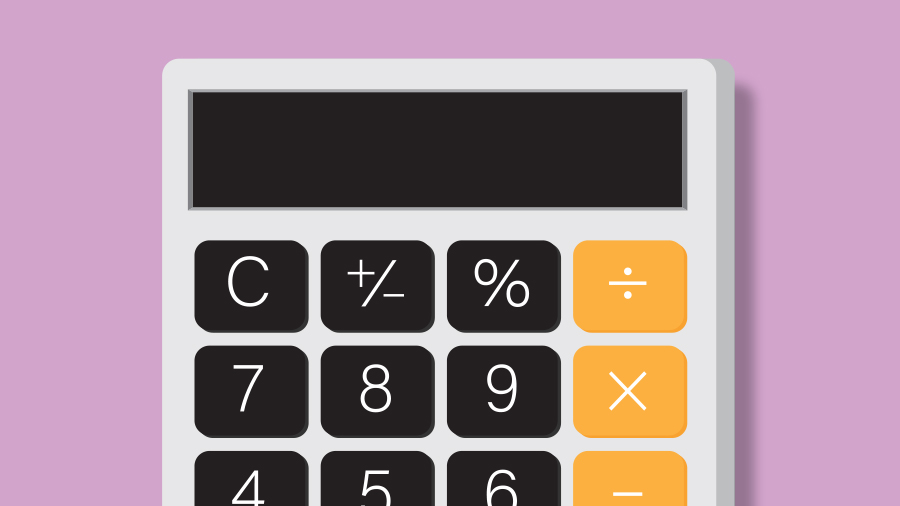
Key takeaways
- Stay vigilant for the latest tax fraud and scams — phishing emails, smishing, vishing, spoofed phone calls, identity theft, spear phishing, and ghost tax preparers — and report any suspicious activity.
- Ignore unsolicited emails or texts claiming to be from the IRS.
- Verify the legitimacy of IRS communications and tax preparers.
- Only pay taxes directly to the U.S. Treasury — never to a third party.
- Consider security measures like an Identity Protection PIN, a six-digit code known only to the taxpayer and to the IRS.
- File taxes early, either electronically or by mail dropped inside the post office.

“Scammers never sleep,” warns Jennifer Hessing, a fraud analytics director at Wells Fargo. “They are constantly evolving their trends and tactics, and tax time is a prime opportunity for them to pounce.” In fact, IRS Criminal Investigation agents identified more than $5.5 billion in tax fraud in 2023 (PDF).
Knowing the red flags to watch for can help you avoid becoming a victim of a scam. For example, the IRS initiates most contact through regular mail and advises they will never initiate contact by email, text, or social media regarding a bill or tax refund. You are not required to pay without the opportunity to question or appeal your tax bill.
According to the IRS, they will not:
- Ask you to pay your taxes using a gift card, cryptocurrency, prepaid debit card, or wire transfer. All tax payments should be made payable only to the U.S. Treasury, and checks should never be made payable to third parties.
- Demand immediate payment or request credit, debit, or bank account numbers.
- Threaten to have you arrested or deported for not paying.
- Make unannounced visits to your home or place of business to discuss taxes owed or tax returns due.
If a caller claims to be from the IRS and you’re unsure, do not respond. Instead, hang up immediately and use the U.S. Treasury Inspector General for Tax Administration site to report the caller or call 1-800-366-4484 to confirm the validity of the caller.
If you are a Wells Fargo customer and respond to a suspicious message by clicking a link, opening an attachment, or providing personal information, call us immediately at 1-866-867-5568.
How to avoid the latest tax fraud and scams
Hessing shares these tips.
Phishing, smishing, and vishing
Scammers posing as an IRS agent, IRS collection agency, or another government agency may use phishing emails, smishing texts, or vishing phone calls to obtain a payment or sensitive information (such as usernames, passwords, social security numbers, and account details). The information can be used to access your account, apply for benefits or refunds in your name, or steal your money.
Tip: The IRS advises they will never initiate contact by email, text, or social media regarding a bill or tax refund. Don’t reply, click on links, or download attachments included with any such communication.
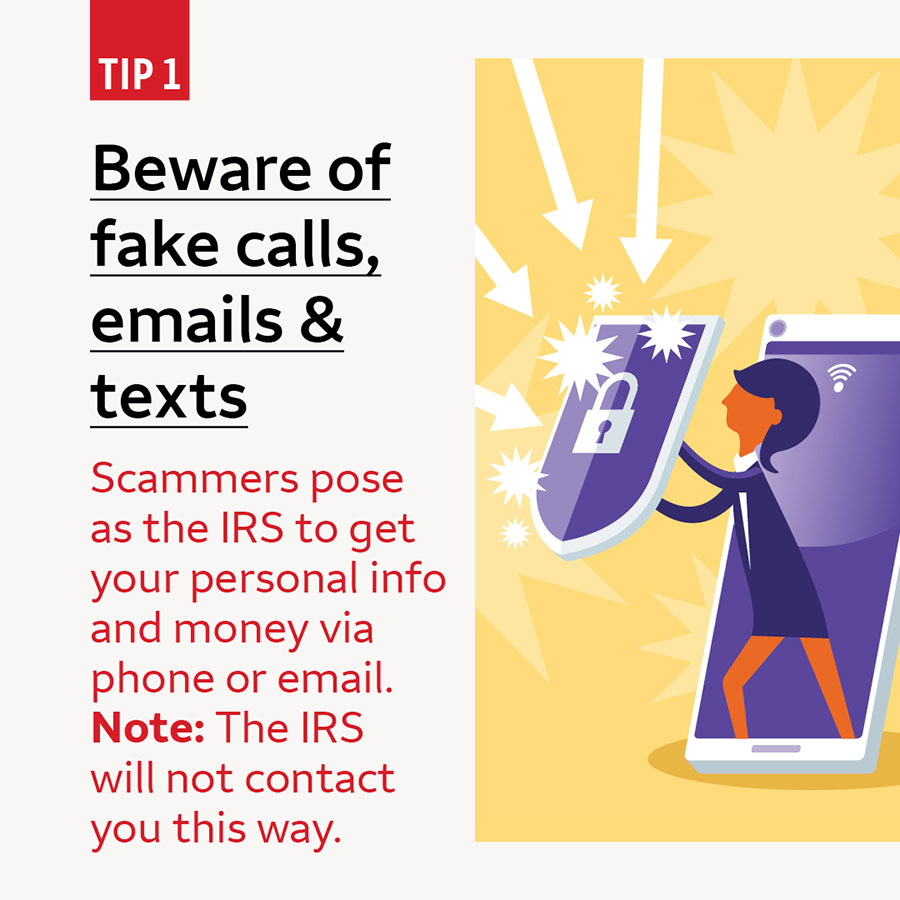
Spoofed phone calls
Someone may call you posing as the IRS or other reputable agency by falsifying the information sent to your caller ID to disguise their identity. They may claim you owe taxes or are due an unexpected refund and demand that you send money through a gift card, cryptocurrency, prepaid debit card, or wire transfer.
Tip: Generally, you will receive several letters from the IRS in the mail before receiving a phone call. The IRS does not leave prerecorded, urgent, or threatening voice messages. If you receive a call and have no reason to think you owe taxes, do not give out any information and hang up immediately.
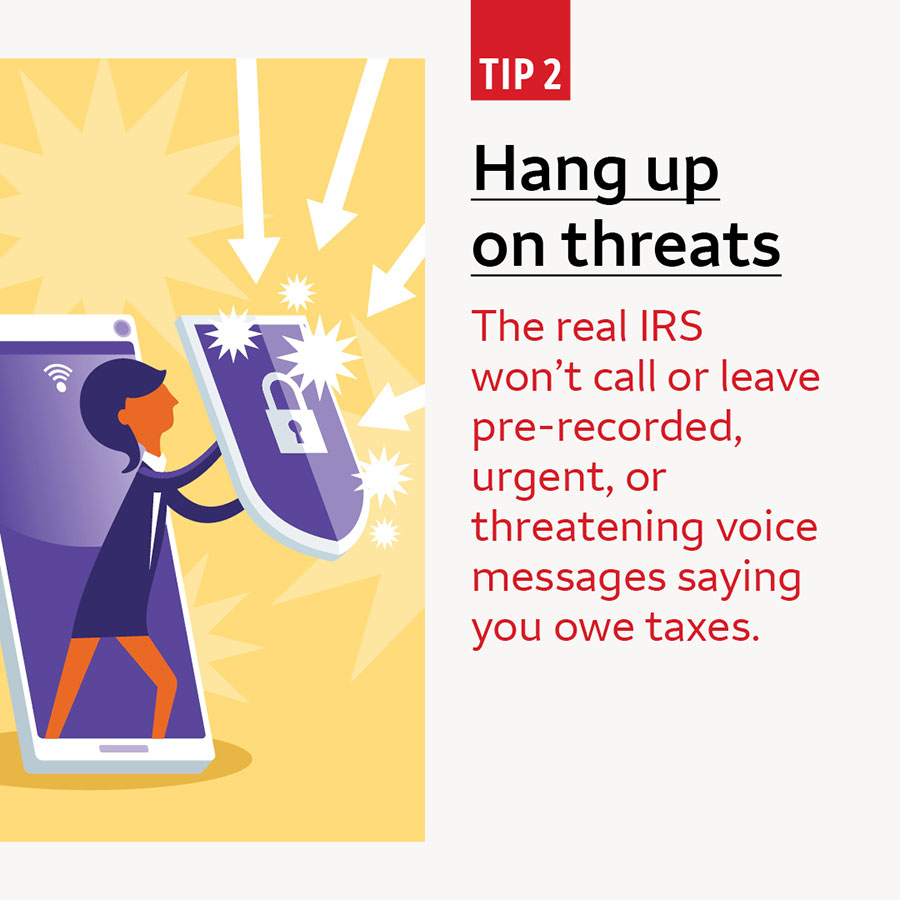
Identity theft and tax fraud
Fraudsters can steal your personal and financial information and use it, along with your Social Security number, to file a fraudulent tax return in your name. Even if the person contacting you has the last four digits of your Social Security number or other identifiable information, do not share any additional information. See How to Report Identity Theft.
Tip: Consider getting an Identity Protection PIN (IP PIN), a six-digit number that prevents someone else from filing a tax return using your Social Security number or Individual Taxpayer Identification Number. The IP PIN is known only to you and the IRS.
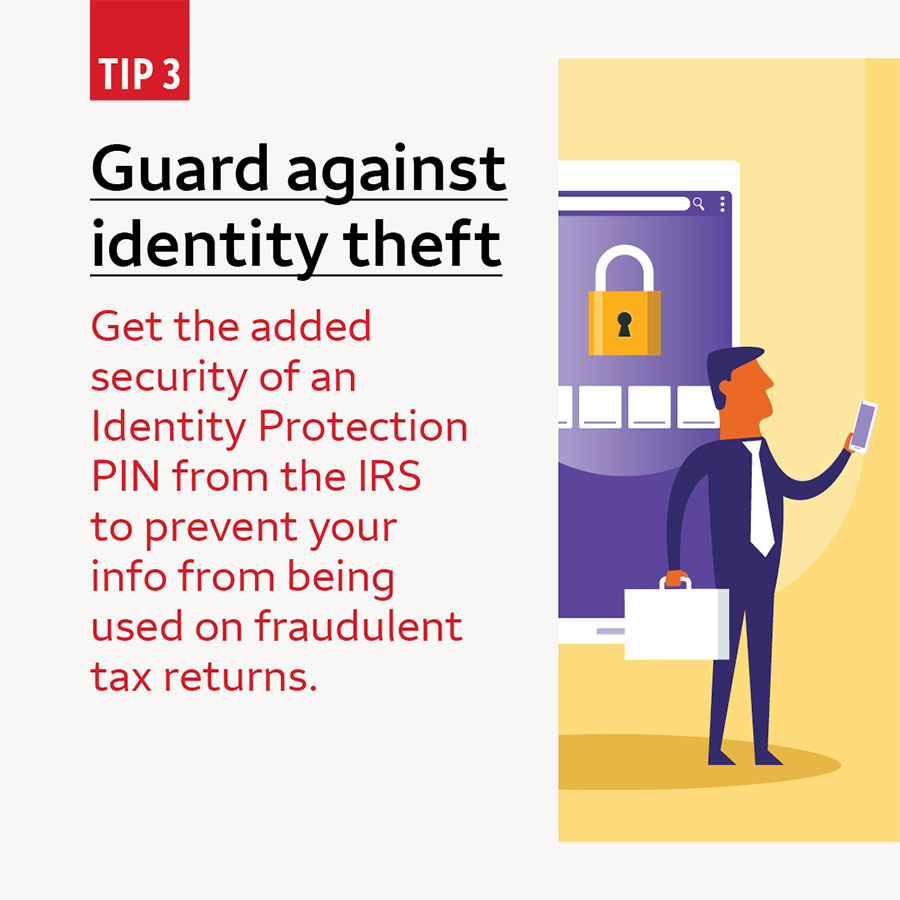
Spear phishing
This term, according to the IRS, refers to email scams that target individuals or groups and may be addressed specifically to you. This may be sourced from client data from tax professionals or directly from you by obtaining your tax software login information, filing a fraudulent tax return, and having the refund deposited into a bank account. Someone claiming to be an “IRS debt collector” will contact you demanding that you to forward the money to their “collection agency,” then threaten you with criminal charges, an arrest warrant, and a “blacklisting” of your Social Security number if you do not return the refund. The caller then gives you a bogus case number and phone number to call to return the money.
Tip: Don’t reply, click on links, or download attachments included with any such communication. Instead, call the IRS directly to confirm.
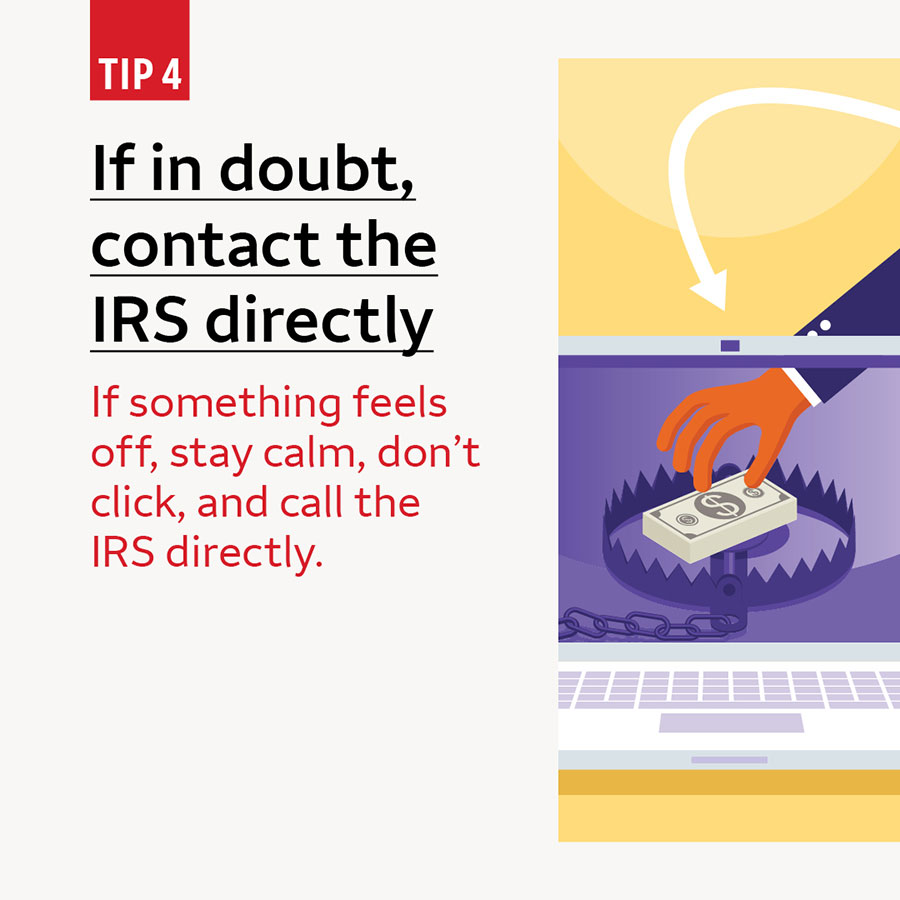
Ghost tax preparers
According to the IRS, these are unscrupulous preparers who promise inflated refunds to prepare a tax return for a fee but refuse to sign, as required by law.
Tip: Never sign a blank or incomplete return. Check the IRS Tax Preparer Tax Identification Number (PTIN) against the Directory of Federal Tax Return Preparers on the IRS website.
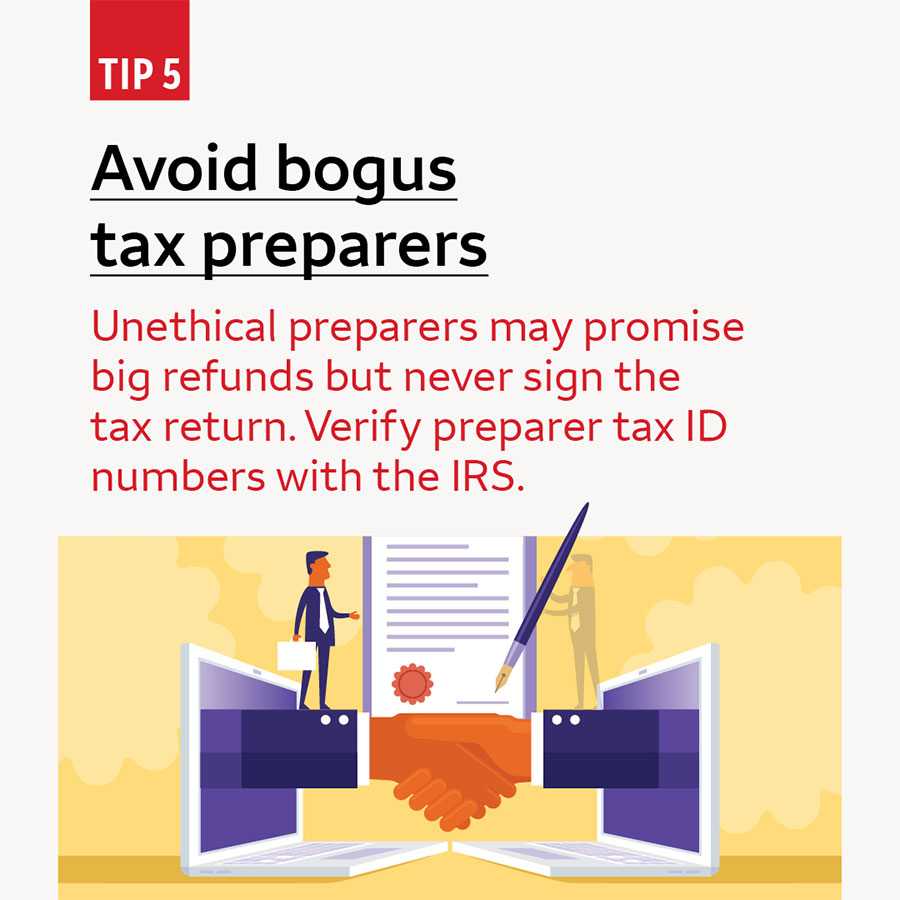
More ways to stop scams
- File taxes early. It can help prevent someone from filing a fraudulent return in your name.
- File electronically or go into the post office to mail your tax returns or a tax payment. Physical mailboxes can be targets for theft as fraudsters look to steal checks for the purpose of altering them or creating fake checks. Read more about ways to prevent check fraud and scams.
- Set up bank and credit card account alerts so you’re notified of suspicious activity.
While fraud and scams may increase during tax season, remember that imposters are always looking for ways to steal money, personal information, data, and more.
We have an important responsibility to proactively alert and educate our customers and communities. We’re continually updating the Wells Fargo Security Center with resources and ways you can protect yourself against the latest scams and fraud.
Read more







